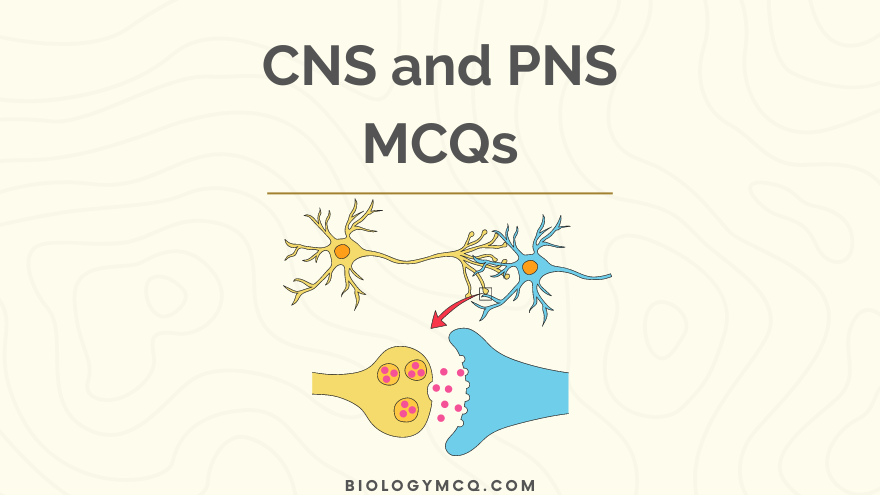Study and Learn with 1000s of Biology MCQs
CNS and PNS MCQs

Our set of CNS and PNS multiple-choice questions (MCQs) explores into various facets of the CNS and PNS, exploring their structures, functions, and roles in regulating bodily functions.
If you’re preparing for an exam or aiming to deepen your understanding of neurobiology, these MCQs provide valuable learning opportunities for students and enthusiasts alike.
Let’s explore the MCQs below and broaden your knowledge of neuroscience!
MCQ on CNS and PNS
central nervous system consists of _
brain
a spinal cord
Both of these
legs
Both of these
Spinal cord sits within a liquid called _ fluid
insulin
plasma
cerebrospinal
All of these
cerebrospinal
_ guards the CNS against shocks caused by movement and helps supply nutrients and remove wastes.
insulin
plasma
Cerebrospinal fluid
All of these
Cerebrospinal fluid
The central nervous system (CNS) and peripheral nervous system (PNS) are integral components of the body’s nerve network. The CNS, consisting of the brain and spinal cord, serves as the core processing center, while the PNS encompasses all nerve structures beyond the CNS, including nerves, ganglia, and sensory receptors.
peripheral nervous system is divided into _ systems
2
3
4
5
2
_ carries signals to and from the skeletal muscles
Autonomic nervous system
Somatic nervous system
Digestive system
Lymphatic system
Somatic nervous system
_ controls many of an animal’s voluntary responses to signals in its environment
Autonomic nervous system
Digestive system
Lymphatic system
Somatic nervous system
Somatic nervous system
the movements you make when walking, throwing a baseball, or driving a car are all controlled by your _ ?
Autonomic nervous system
Digestive system
Lymphatic system
Somatic nervous system
Somatic nervous system
_ controls the (mostly involuntary) internal processes in the body, such as heartbeat and digestion
Autonomic nervous system
Digestive system
Lymphatic system
Somatic nervous system
Autonomic nervous system
Autonomic nervous system has _ divisions
3
7
8
2
2
_ automatically stimulates the body when action is required
parasympathetic nervous system
sympathetic nervous system
Digestive system
Lymphatic system
sympathetic nervous system
_ is the part of the nervous system responsible for the fight-or-flight response
parasympathetic nervous system
sympathetic nervous system
Both of these
None of these
sympathetic nervous system
sympathetic nervous system stimulates a surge of _ to give the body quick energy so it can escape danger
adrenaline
Amylase
Protease
All of these
adrenaline
_ quickens the heart rate to move blood through the blood vessels faster
parasympathetic nervous system
sympathetic nervous system
Digestive system
Lymphatic system
sympathetic nervous system
_ releases sugar from the liver’s glycogen stores into the blood so fuel is readily available to the cells
parasympathetic nervous system
Digestive system
Lymphatic system
sympathetic nervous system
sympathetic nervous system
_ stimulates more routine functions, such as the secretion of digestive enzymes or saliva
parasympathetic nervous system
Digestive system
Lymphatic system
sympathetic nervous system
parasympathetic nervous system
_ slows down the heart rate after the fight-or-flight response is no longer needed
parasympathetic nervous system
Digestive system
Lymphatic system
sympathetic nervous system
parasympathetic nervous system



